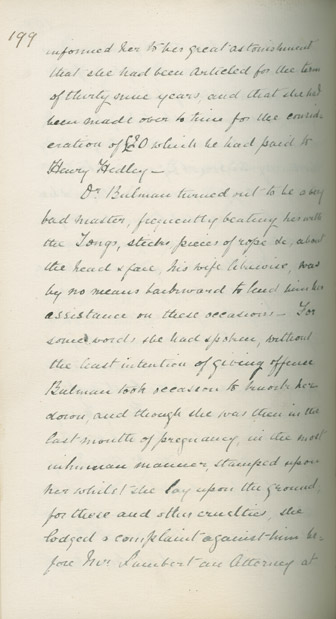Nova Scotia Archives
African Nova Scotians in the Age of Slavery and Abolition
John Clarkson's account of the story of Lydia Jackson
note: transcription publicly contributed - please contact us with comments, errors or omisions
informed her to her great astonishment that she had been articled for the term of thirty nine years, and that she had been made over to him for the consideration of £20 which he had paid to Henry Hedley.
Dr. Bulman turned out to be a very bad master, frequently beating her with the tongs, sticks, pieces of rope &c. about the head & face, his wife likewise was by no means backward to lend him her assistance on these occasions. For some words she had spoken with the least intention of giving offence Bulman took occasion to knock her down, and though she was then in the last month of pregnancy, in the most inhuman manner, stamped upon her whilst she lay upon the ground; for these and other cruelties she lodged a complaint against him before Mr. Lambert an Attorney at
Lydia Jackson was likely one of two persons named 'Lydia' from South Carolina listed in the Book of Negroes (1783). Clarkson narrates her ordeal in his journal. A free black settler at Manchester (Guysborough County), Jackson was deserted by her husband and became an indentured servant to a Loyalist. He tricked her into agreeing to a much longer term of service and immediately sold her, as if she were a slave, to Dr John David Bolman of Lunenburg. Bolman had been a Hessian regimental surgeon (on the British side during the American War of Independence.) He abused her severely, even while she was in the last month of pregnancy. After three years she escaped to Halifax. Not surprisingly, she was among those who chose to emigrate to Sierra Leone.
Like her more famous contemporary, Rose Fortune, Lydia Jackson has not been forgotten. Her ordeal has been the subject of poetry as well as history. She appears as an icon ("Lydia Jackson, slave madonna") in a 1982 poem expressing rage against slavery, nearly 200 years after Clarkson wrote about her in his journal. (George Elliott Clarke, "Hammonds Plains African Baptist Church" in George Elliott Clarke, ed., Fire on the Water: An Anthology of Black Nova Scotian Writing vol. 2, Pottersfield Press 1992)
Date: 30 November 1791
Reference: John Clarkson Nova Scotia Archives MG 1 volume 219 pages 197-201; published in Clarkson's Mission to America, 1791-1792 page 89-90 (Public Archives of Nova Scotia Publication number 11, 1971) (F90 /N85/ Ar2P number 11)

